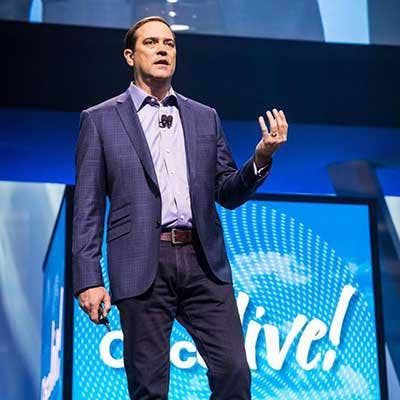CRN Exclusive: Cisco's Service Provider Leader Says Web-Scale Companies, Service Providers Need Channel Partners

The Times They Are A Changin'
As bandwidth demand explodes in the service provider [SP] space and web-scale infrastructure companies like Google and Facebook are moving at lightning speed, Cisco needs its channel partners to play a larger role in providing solutions to help the networking giant become faster and more efficient, says Cisco's new Service Provider leader Yvette Kanouff.
"Going forward, the partners are going to play a bigger role in making us go faster to meet these SP requirements," said Kanouff, in an interview with CRN at Cisco Live in Las Vegas this week.
As web-scale companies and SPs transform the way they buy, build and invest in IT, opportunities for solution providers will flourish and Cisco is training its channel to win more sales, said Kanouff.
Kanouff takes a deep dive with CRN on the service provider market, Cisco's "close relationship" with web-scale companies, the opportunities ahead for 5G and how CEO Chuck Robbins is changing the company.
"[Robbins is] really showing the world that we are going to change. We're going to be cloud-first," she said.

Service providers are moving to the cloud and changing the way they're buying infrastructure and services. How is Cisco going to change the way it sells now?
The SPs have to build new networks in a different way -- they have too. From Cisco's perspective, we have to focus on throughput and ASICs and boxes. We [also] have to go up the stack and focus on, not just virtualization, but management of the cloud.
The third layer is we have to look at the services that we offer, like business services, and say how much of that do we have to run in the cloud. The question is, 'Is it our cloud or their cloud?' There's just so much still up in the air right now.

Will software now play a more important role for Cisco in the service provider market?
Over the next five years, you're definitely going to see software have more value. You're going to see the box value go up-stack – meaning that you're going to see more control planes and functions out at a higher level of management, very much going along with the cloud story.
If you look at application business services, the enterprise channel market – all of that, how much can be managed in the cloud? So AT&T, Verizon, Deutsche Telekom, so many of these SPs have been very vocal about their move to build out their cloud infrastructure.

What role will channel partners play for Cisco in this new way of selling to service providers?
The whole industry is transitioning toward virtualization, moving to cloud delivered services -- all of that means the entire industry has so much new opportunity.
In terms of selling to the SPs, the channel partners play a huge role in helping us move quickly. We've got a number of very large reseller partners who actually help us not only do all the classic fulfillment, but are now much more engaged in helping us do system integration as we move up the stack towards the SPs themselves in getting to a stage so they can move a lot faster. Frankly, going forward, the partners are going to play a bigger role in making us go faster to meet these SP requirements.

How is Cisco enabling partners to sell to service providers to help them in this transformation?
If you think about the future, the SPs become a platform for innovation. You need all kinds of new skills – development skills, automation, orchestration -- and it's basically taking our [partners] who've worked with us for many years and helping reskill them effectively and give them more tools to make these networks more profitable and drive a better business outcome. We're in the process of actually creating some of those new certifications.
We see many opportunities for network managers, network engineers [and] application developers that are going to be network centric – it's a pretty exciting time … Hopefully, all of our channel partners are excited about it – they should be.

Cisco recent witnessed a 31 percent spike in sales among your top 10 web-scale customers – the Googles and Facebooks of the world. Do you see these giant companies as customers, partners and/or competitors?
You look at these web-scale companies -- huge data centers, massive interconnect where everything down to physical location matters -- the level of design and stability is so massive.
People think, 'Well, when you're at that scale you can build your own.' I think that's not at all the way that our partners are looking at it. We have great relationships with the web companies. What they're looking at is, 'Look, these are my needs in order to have this massive scalability at the rate at which we are building. So I need to either be able to build it myself, because there's nothing that meets the scalability and price-points, or I'm happy to use a partner if you can help me solve my solutions.' That's what we've done.

So how is Cisco working with these web-scale companies and is there any channel partner opportunities here?
We're working very closely together with these companies and saying, 'What are the needs?' We are understanding and working together on this whole 'How we're building data centers. How they're located. How we can connect them. At what speeds can we do it?' We have some really great products that meet that need and meet the scalability [needs].
The same rules apply [for channel partners]. For the web-scale guys, it's all about speed and scale, and this is where the channel partners will really help them execute on that.

So you have channel partners today providing solutions to some of these web-scale companies?
Absolutely.
Is it solution providers like World Wide Technology, Presidio and GTD?
It tends to be the bigger guys. Those companies that you just mentioned.

What are these channel partners selling to these giant web-scale companies?
A lot of it ends up being around speed-to-scale. [A service provider has] got to put a new data center in. Pick a new city or site and in a lot of cases, because of their contracts, the web-scale guys now have to get equipped very, very quickly.
There are some contracts in place with Amazon and [Microsoft] Azure with basically unlimited capability commitments to the end customers with zero notice. Think about what that means … Amazon and Azure has to give you the capability and there's no notice. You can say, 'Tomorrow I want 1,000 servers.' What that means is, they have these very, very quick cycles they have to respond to and this is really where the [channel] partners can jump to help deliver the full value proposition. That's why we've gotten so close with them.

Can you give me a rough estimate of the percent of Cisco sales that are direct and indirect to these web-scale companies?
There is a direct relationship, of course. In some cases it's a mix, but the big channel partners really play a huge role for us.
We have to be careful because we're asked so [often] to take apart that web-scale growth [figure]. We just have to just watch what we publicly say there. Everybody wants to know and it's great, but we just have to be careful what we want to disclose.

What is the biggest opportunity for channel partners to really ramp up their revenue in both the service provider and web-scale spaces?
The web-scale players have been looking at it from a data center perspective. The SPs have been focused more around a bigger infrastructure play, but now what's emerging between all of those is the ability to be elastic, scale-fast. So that's what I would say is the top thing, which is scale fast and efficient.
By making them more fast and efficient it means, as we go toward virtualization and things like that, you can leverage an infrastructure, and grow, and add-on services in a quick way -- that's somewhere channel partners can help an operator get there and help them save their OpEx and move fast and efficient. That would be the best thing they can do.

What are the biggest opportunities looking ahead for channel partners in the web-scale and service provider space?
Three things. You've got core infrastructure, data center, cable – the bandwidth that we're seeing the growth in the cable side continues to be a huge opportunity – and then 5G. 5G may not be so much in 2016, that's a little bit further out.

Why will 5G be such a big opportunity for Cisco partners when it gets adopted?
If you think about the demands on the network, the growth that we're seeing, what's going to happen very quickly is once 5G gets into production, people are going to want it immediately. The roll-out cycles are just compressing. We see in the next couple of years, just big opportunities across the board and those are all things channel partners can play a very central role in.
Why are service providers needing to shift and transform so quickly?
Bandwidth expectations are continuing to grow and [SP] revenue is not growing along with that. They have 50 percent increasing bandwidth [usage] every year, it has been like that for years. But look at the revenue they're getting from bandwidth – it's not increasing 50 percent. You have more devices that you buy and use and you're constantly increasing your own bandwidth use, but you're not expecting your bill to increase.
So the SPs have to look at all these things, which is, 'How do you network in a different way? Where's my revenue growth really going to come from?'

You were a former executive for a service provider (Cablevision). What's going through these large service providers' heads right now?
If I look at it [through] the SP lens, I have to look where it is that I'm expanding and how I can expand. How do I change the network infrastructure and expand into enterprises? So now the SPs are looking at the enterprise side and saying, 'Well I have connectivity. I have things like VPN and then all the add-on services. How can I as a network provider offer value to you as the enterprise. I can have your Wi-Fi. I can do small cells in your building, I can do firewall – many different implementations of an on-prem [network].'
So it's seen as an opportunity for SPs to say, 'I have to figure out how I'm going to expand my business.' There's so many shifts going on. If you look at that holistic picture, it's absolutely affecting the way that SPs are thinking and building and investing.

How is Cisco going to win more market share in the service provider space during this transition?
I consider it our responsibility as the number one networking company in the world to help solve the way that networks are going to work tomorrow. We have to do that.
And it's not, 'The world is changing and there's a lot of bandwidth growth, so we're going to keep building the same thing we built.' No, we have to read the transition. The flexible elastic networks, automation in networks, building the right hooks into those networks for what we need to grow that Internet of Things infrastructure – that's what I want to do. And that's why we've pulled our service provider engineering groups together, because we can no longer work separately.

CEO Chuck Robbins disrupted Cisco's whole engineering team with that. Can you talk about the change in Cisco since Robbins' took over as CEO?
Chuck has been incredibly bullish on the fact that we're going to structure ourselves in order to make sure that we succeed from where it is that Cisco wants to go. He's saying, 'What's the future? It's going to be applications. It's going to software-based. It's going to be cloud. So I'm going to make that front-and-center.'

Was that change needed in Cisco?
It's was a very bold move. He's really showing the world that we are going to change. We're going to be cloud-first. We're going to be focused on cloud and data center together, and applications and moving our services to cloud-based, recurring revenue. He talked about it very openly and he's putting his organizational decisions behind it. It's very cool.
How confident are you in running Cisco's new service provider business?
Watching how this plays out is going to be interesting. It's the reason I'm here because it's a fun time to be in technology, when the technology is changing. There's definitely an entire industry change that's happening and I look forward to leading it.